

CHRISTIAN LEADER













Maybe we should leave it up to God to speak to those we care about, and we should take care to listen into their lives.
“I thought I heard the captain’s voice, but its hard to listen while you preach.” —Bono in U2’s Every Breaking Wave
Listening is a spiritual discipline worth our attention during Lent. To be honest, listening is something I should probably work on 365 days of the year instead of just the 40 days of preparation for Easter Sunday.
Listening is different than hearing. We all—or at least most of us—can hear. But do we listen? We hear with our ears; we listen with our souls. Hearing is mechanical; listening is human. Listening is incarnational; it concentrates on the other person. Sometimes when I only hear, my mind wanders. But when I’m listening, you have my full attention; I focus on you and not myself or anything in the environment around us. When I listen, everything else is on “mute.”
What keeps us from listening? Perhaps speaking too much and too quickly. The author of Ecclesiastes cautions his readers to “let your words be few” since many words “mark the speech of a fool” (5:2-3). Both the preacher of Ecclesiastes and the apostle James urge us to slow down when it comes to talking. “Do not be quick with your mouth,” says Eccles. 5:2. While everyone else is busy talking, our call as followers of Jesus is to be slow to speak but quick to listen (James 1:19). I think there is a good reason James 1:19 ties becoming angry with the encouragement regarding listening and speaking. I don’t know about you, but when I am angry I usually stop listening and begin expounding louder and faster on the truth as I see it. And most of the time, nothing good comes from that combination.
We sometimes talk about “speaking truth” into the life of another person. Maybe we should leave it up to God to speak to those we care about, and we should take care to listen into their lives. My resolution for this Lent season is to economize my words while listening generously and abundantly.

Connie Faber Editor
















Dwight Carter

Growing up, one of my favorite TV game shows was “To Tell the Truth.” In this game a panel of celebrities were presented with three people who claimed the same identity. The celebrities’ challenge was to question the contestants in order to distinguish which contestant was the real person. Two of the presenters lied as they answered the questions and one was sworn to tell the truth, thus the questions had to be framed in such a way that the panel could distinguish between the truth tellers and the liars. After several rounds of questioning the host would ask if the real person would stand up and the celebrities would see if their guesses were correct.
Much like the classic game show, today there are many religions that claim to represent the true identity of God. If one doesn’t ask the right questions and seek the truth, one can easily be led astray and never discover the identity of the one true God. In John 11:25, Jesus makes an amazing claim about himself that separates him from all others who try to claim his identity. In a sympathetic statement to his grieving friend, Martha, Jesus says, “I am the resurrection and the life.”
While other spiritual leaders have lived for and served their followers—perhaps even some giving their own very lives for their cause—Jesus is the only one to have the power and authority to claim victory over death. His words to Martha are words of reassurance and hope. He reminds her that the pain that she is experiencing in the loss of her brother, Lazarus, is only temporary. When she has nothing else to hold on to, she has the hope and promise that Jesus offers by being the life-giver.
Life is not a game show. Like Martha, we too live with pain and loss. But we can also live with that same hope that she has. The historical evidence and proof of Jesus being the one who overcame death by his resurrection is overwhelming. His resurrection is proof of his identity, and it gives us the hope that our future resurrection will be just as the Scriptures promise. The Apostle Paul reminds us that the resurrection is so significant that if it were not true, our faith would be useless and our service to him would be in vain (1 Cor. 15:14).
However, when we see the true identity of Jesus, one that no one else in history can claim, we are able to keep our hope even when the troubles and burdens of this life weigh us down. Because Jesus is the resurrection and life—the one who won the victory over death—we can stand firm. We can give our lives fully to the work of the Lord because we know that our labor in the Lord is not in vain.
Dwight Carter is lead pastor at Zoar MB Church in Inman, Kan.

CHRISTIAN LEADER
March / April 2016
Volume 79 • Number 2
Connie Faber EDITOR
Myra Holmes ASSISTANT EDITOR
Shelley Plett GRAPHIC DESIGNER
Steve Wiest
COVER PHOTO (See story page 17)
The Christian Leader (ISSN 0009-5149) is a gathering place for the people, passions and mission of U.S Mennonite Brethren. The Christian Leader is published bimonthly by the U.S. Conference of Mennonite Brethren Churches. However, the opinions expressed here are not necessarily those of the church as a whole.
COPYRIGHT The articles printed in the Christian Leader are owned by the CL or by the author and may not be reprinted without permission. Unless noted, Scripture quotations are from the New International Version.
READER PARTICIPATION Letters to the editor should be 300 words or less and on one subject. Letters must be signed and include the writer’s city and state. Letters will be edited for clarity, appropriateness and length. Letters will be published, as space allows, unless marked, “Not for publication.” Readers interested in contributing essays for In My Humble Opinion and First Person should contact the editor. Freelance article submissions are welcome; a SASE must accompany articles.
SUBSCRIPTIONS $10 for six issues and $20 for 12 issues ($15, $30 in Canada; all other countries $25 for six issues); $1.50 per copy
CORRESPONDENCE: All correspondence, including subscription questions and address updates, should be addressed to Christian Leader Box 155, 107 N. Main, Hillsboro, KS 67063-0155 Phone: 620.947.5543
E-mail: christianleader@usmb.org
MEMBERSHIP The Christian Leader is a member of the Evangelical Press Association and Meetinghouse, an association of Mennonite and Brethren in Christ editors.
POSTMASTER Send address changes to Christian Leader, Box 155, Hillsboro, KS 67063. Periodicals postage paid at Hillsboro, Kansas.
The Christian Leader is published by
Jesus said to her,
“I am the resurrection and the life. He who believes in me will live, even though he dies.”
John 11:25

U.S. Conference of MB Churches

Wendell Loewen Ministry Quest director
Cultivating a culture of calling
Reviving our commitment to intentionally identifying leaders
Iasked Kelsie, a prospective Tabor College student, why she was considering a career in ministry. “I just thought it would be awesome,” she exclaimed. So, I pressed her a little. “Who helped you with this decision?” “No one really,” Kelsie replied. “I made it myself!”
Kelsie’s story is not uncommon. In fact, an overwhelming majority of prospective students tell me of a deeply personal but individualistic and private call story. Most often, their sense of call includes a significant event, such as a mission trip. Occasionally, I hear about students being influenced by a mentor or family member. But in almost 20 years at Tabor College, I cannot recall ever hearing a corporate call story—one that involves the collective intentionality of the faith community.
My role as a ministry professor at Tabor and director of Ministry Quest, a youth leadership program, has had me paying close attention to the leadership development landscape of our denomination. Sadly, I believe we’ve lost the sense of corporate calling.
I’m continually encouraged by the story of Carson MB Church. Decades ago this Minnesota congregation agreed together to call, nurture and send out a generation of young leaders as missionaries, pastors and denominational leaders. One small rural congregation left a legacy that will last for generations—one that reaches around the world.
Cultivate a culture of calling
Our MB story is one of a small denomination that lives out God’s Word and follows Jesus daily. We have so much to offer the wider Christian community and our world. What if we worked together as churches, denominational agencies and institutions to cultivate a culture of calling our young leaders? Our kingdom influence would expand exponentially.
Prioritize
Cultivating a culture of calling means that our churches prioritize leadership development. This is the work of the entire faith community, not just that of a few youth volunteers. Such a priority could include
making it a focus of an annual sermon series. Or creating a budget line item specifically for leadership opportunities. How about having the value of leadership development reflected in our mission/vision statements?
Nurture
Cultivating a culture of calling could also include a commitment to mentoring relationships. Are there ways in which your congregation can connect potential leaders with current leaders? In their biweekly meetings they could talk about their faith, develop leadership skills and consider the unique demands of leadership in the church. Mentoring relationships are rich and rewarding for both the mentee and the mentor.
Test
Cultivating a culture of calling requires real-life opportunities to practice, test and evaluate leadership gifts. This could mean offering young leaders the opportunity to preach, lead worship or serve on various church committees.
Send
Finally, the congregation should willingly send out their leaders. I am blessed to be a part of a congregation that is committed to local and global mission. In recent years we have called out and sent countless young people all around the world. Selfishly, we’d love to have them stay, but God’s call and his kingdom extends far beyond our four walls. We must be committed to releasing our young leaders into God’s care, wherever that may lead them.
Our fluid and fragmented world calls for effective and durable Christian leaders. Those are best nurtured corporately. Let’s join together and cultivate a culture of calling.
Wendell Loewen is the director of Ministry Quest, soon to be Faith Front, a mentoring and leadership program for high school students, and professor of youth, church and culture at Tabor College. He is a member of Parkview MB Church in Hillsboro, Kan.
Cultivating a culture of calling requires real-life opportunities to practice, test and evaluate leadership gifts.
RJ Thesman
Praying for death
How do we pray when faced with Alzheimer’s?
During my father’s 10-year journey into dementia, he forgot who I was, ceased to speak and became an infant. I begged God to take him home. Even as I prayed, I felt guilty. Was it right to ask this of God who designs our timelines from the moment of conception? Is it okay to pray your loved one will die?
Still, I could not bear to see my beloved father lying in a hospital bed, diapered and fed by my mother.
“Please God, take him home,” I prayed. God granted that request one spring day when Dad quietly stopped breathing.
And now my mother faces a similar fate. Diagnosed with Alzheimer’s, she currently resides in an assisted living facility. If she continues to live, she will regress into the infant stage and move into total nursing care.
Except for the Alzheimer’s, she is a healthy 87year-old woman who walks daily in the hallways and visits with other residents. No one cares that she repeats the same questions over and over. She rarely visits the doctor, only for routine visits and checkups on her medications.
Yet she lives within this time bomb of a disease that is slowly dissolving her brain into plaque-encrusted nodules of forgetfulness. She never wanted this. She fought with us when it was time to go to assisted living. “Don’t put me in a nursing home,” was her cry for many years. But when Mom could no longer live alone, we had to make that difficult decision.
Currently, she seems content with her surroundings, but I know what will happen. And it isn’t pretty. So I am praying God will take her home easy—just as he did for Dad. I do not want my mother to dribble her food, go through diaper changes or scream as the result of daily nightmares.

Perhaps I am not fully trusting in God who designed our brains and somehow allows neurological diseases to interrupt otherwise healthy bodies. I’m sure I don’t understand all the possible aspects of what God can do in families that deal with Alzheimer’s.
Certainly, God teaches us patience and endurance. He graces us with the strength we need for each day. But it is my belief that Dad now resides in heaven with God, completely free of any dementia symptoms. When my mother breathes her last gulp of oxygen, she will join my dad and her Savior in eternity. What could be better than that?
Although I believe in the certainty of heaven, I hated watching Dad wither away, and it breaks my heart to see Mom heading in the same direction. I know the Sunday school answer is to just trust God, but I don’t care if my faith is small or if I need to learn more about trust.
I know with certainty that Alzheimer’s is a horrid disease that kills brains and torments families. I am tired of watching it destroy my parents, and I don’t want to see it continue. I believe that sometimes letting go requires more love than hanging on. I am praying for Mom’s death.
RJ Thesman is the author of the Reverend G books, Christian fiction about a woman minister diagnosed with Alzheimer’s disease. Thesman writes and speaks on caregiving and finding hope when life unravels. She is a certified writing coach and program director at GateWay of Hope, a nonprofit organization that offers counseling, coaching and support groups for women. Thesman, who lives in Kansas, blogs at www.RJThesman.net.


MB Foundation launches GIVING CHALLENGE
MB Foundation is collecting stories of generosity through April for their Giving Challenge. Each story will be entered to win $5,000 to give away to the ministry of the winner’s choosing.
The purpose of the Giving Challenge is to encourage generosity through the sharing of stories and to release additional money into ministry. The one who shares the story may be the giver or the recipient of an act of generosity. Each story received will be entered into a random drawing, and winners of the drawing will distribute funds to the charity(ies) of their choosing. Eligible charities include local churches, schools and mission agencies.
“We believe this has the potential to benefit everyone, because everyone has a generosity story to tell, and everyone knows of a ministry or charity that could benefit from $5,000,” says Jon Wiebe, president and CEO of MB Foundation. “We hope that the Giving Challenge can combine these two ideas.”
MBF is the stewardship ministry of U.S. Mennonite Brethren. Enter online at www.mbfoundation.com/givingchallenge. –MBF
Varvis transitions to teaching

Stephen Varvis, provost and senior vice president of Fresno Pacific University (FPU), the Mennonite Brethren-owned school headquartered in Fresno, Calif., will leave his administrative roles and return to teaching as a full-time faculty member, effective summer 2016. Varvis has served in leadership roles at FPU for over 30 years, including business manager, dean of the college, director of business and civic relations, vice president for enrollment, provost and senior vice president. “In one way or another he has shaped every aspect of Fresno Pacific University as it exists today, and he has profoundly influenced countless students and colleagues,” says FPU President Richard Kriegbaum in a blog post about the transition. The university plans to appoint an interim provost/vice president by summer 2016. –FPU
Tabor College receives $600,000 grant
Tabor College, the Mennonite Brethren-owned liberal arts college in Hillsboro, Kan., has received a $600,000 grant to establish Faith Front as part of Lilly Endowment Inc.’s High School Youth Theology Institutes initiative. The initiative seeks to encourage young people to explore theological traditions, ask questions about the moral dimensions of contemporary issues and examine how their faith calls them to lives of service.
Faith Front is designed to equip Mennonite Brethren and other Christian youth, ages 14 to 19, develop theological competencies essential for ministry leadership with special emphasis on pastoral ministry and other church vocations.
Ministry Quest (MQ), Tabor College’s current leadership program for high school youth, will transition to Faith Front in July 2016. During the past four years, Tabor has operated MQ, which the college acquired from MB Biblical Seminary in 2011. The U.S. Conference (USMB) has been a partnering organization in MQ and is also backing Faith Front. Wendell Loewen, current director of MQ, will direct the new program, and students will be able to apply for Faith Front in July of 2016. –TC

The schedule for the USMB Biennial National Convention and National Pastors’ Conference is designed to encourage connection with others from the USMB family, with more time for event-goers to build relationships with old friends and new. The convention schedule includes an evening dessert reception and extended meal times. Those attending the pastors’ event will have ample opportunity to take advantage of free time options in the northern Denver area, including free tours of the Leaning Tree card and gift factory or the Celestial Seasonings Tea factory or a visit to the family-friendly Butterfly Pavilion and Insect Center. For those who wish to extend their stay in the area, the greater metro area and nearby Rocky Mountains offer a variety of activities. The National Pastors’ Conference will be held July 27-29, followed by the National Convention July 29-30. Register at www.usmb.org/PressOn2016.
Convention schedule, activities encourage connection byTheNumbers
Top five things people are giving up for Lent this year:

5 minutes with...

Jacob Wiens
IfyourideDisneyland’s narrow gauge railroad with Engine Number 1 or Engine Number 4 at the lead, take a good look at the paint job on that recentlyrefurbished steam locomotive. Jacob WiensfromReedley(Calif.)MBChurchisthepainterona teamthatdidtherestoration.Twenty-three-year-oldJacob wiped the paint and solvent off his hands and picked up the phone for a Fast Chat interview.


What is it like to work for Disney?
They want everything to look perfect—a complete restora on from the ground up. Most steam trains are greasy and dirty, but Disney’s are show pieces. When we deliver it we stay at the Disneyland Hotel and there’s a li le handingover ceremony.
How do you do a restoration?
Eight or nine of us work together. We’ll tear the engine down and label everything with its own part number. We take pictures of it from every angle so it goes right back where it was. I do all the body work. Every part is evaluated to see how worn out it is, and I have to make it smooth like plas c.
Where does Disneyland get their trains?
Some had a life before they came to Disneyland, like a logger or something. The last train we did was one Walt built himself for Disneyland. He was a huge train lover.
Is there something Christians could learn from the train-loving community?
The older guys are always ready to help you learn. They want to pass down the knowledge to the next genera on. And people like my boss always refer back to what the previous genera on have passed down to him.

What is your current project?
We’re building locomo ves and cars for a piratethemed train for a resort. When it’s done we’ll all go down to Trinidad and lay the 1,500 feet of track.
Interview by Kathy Heinrichs Wiest
FPU graduates 400
More than 400 students graduated with degrees from Fresno Pacific University, the Mennonite Brethren-owned school headquartered in Fresno, Calif., in ceremonies held Dec. 11. About 246 students graduated from the bachelor’s degree completion program, which serves adult students, usually with work and family responsibilities. Another 100 received master’s degrees in a variety of disciplines in business, education, management and leadership. An additional 65 graduated from the traditional undergraduate program and three from Fresno Pacific Biblical Seminary. –FPU
Historical commission awards grants
Anicka Fast, Harold Jantz and Jayaker Yennamalla are the 2015 recipients of the Historical Commission’s Mennonite Brethren studies project grants. Fast is a doctoral student from Montreal. Her project title is “Identity and power in mission: a study of cross-cultural relationships among North American and Congolese Mennonites.” Jantz is from Winnipeg, Man., and served as the editor of the Mennonite Brethren Herald from 1964 to 1985. His project involves translating and publishing selected content that appeared in the weekly German-language newspaper, Mennonitische Rundschau, from 1929 to 1930. Yennamalla is a doctoral student in Kottayam, Kerala, India and a church history lecturer at MB Centenary Bible College in Shamshabad, India. His project title is “Mennonite Brethren Mission for social change in South Telangana (1899–1958).”–MBHC

Tabor, FPU granted antidiscrimination exemptions
Both U.S. Mennonite Brethren institutions of higher learning are among about three dozen colleges and universities that have been granted waivers exempting them from some federal antidiscrimination laws. Title IX is a 1972 federal law prohibiting discrimination on the basis of sex in any federally funded educational program or activity. When the law was passed, Congress added a provision that educational institutions “controlled by a religious organization” do not have to comply if the law is not consistent with the organization’s religious tenets. Both Tabor College and Fresno Pacific University (FPU) cited their ownership by U.S. Mennonite Brethren district conferences and their desire to uphold the USMB Confession of Faith in their requests to the U.S. Department of Education. Tabor requested and was granted three exemptions related to issues of gender identity. FPU was granted 16 exemptions that include exemptions governing admission, education programs, facilities, athletics and employment.—MWR


MCC provides blankets, warm clothing in Nepal
Mennonite Central Committee (MCC) is assisting families displaced by an April 25, 2015, earthquake as they await government support for construction of new homes. More than 30 districts across Nepal are still struggling with the impact of the 7.8 magnitude earthquake, as well as a second quake a few weeks later. More than 8,200 people died and more than 488,000 homes were affected. Since mid-December, MCC and its partners have provided about 1,280 households with materials such as blankets and winter jackets, including these people from Bhasbhase village in Dhading District who are hiking back up the mountain to their homes. MCC is an inter-Mennonite agency that provides peace, relief and development in the name of Christ. –MCC



Thedark Friday called GOOD Thedark Friday called GOOD
The cross does not have the final word




By Dave Ens
It’s terrifying to be forgotten. Imagine you’re a child walking through a mall, and you suddenly realize you’ve become separated from your parents. Or you’re an adult who walks into the house to find doors unlocked, lights on, TV blaring—but not a person anywhere. What if you’ve been left behind, forgotten? The fear is palpable.
Now let’s imagine the disciples as they witnessed the events of Passion Week, the last week of Jesus’ life, unfold in front of them. In the garden of Gethsemane, they watched as the man they had served for three years was taken away without even a fight.
As much as we may judge the disciples for running away and deserting Jesus in his hour of need, part of us understands the fear that comes from seeing everything you’ve lived for—everything you’ve based your future on—taken away. The reason behind the disciples’ existence suddenly vanishes. They are left behind. Forgotten. And then to stand and watch Jesus die on a cross … surely, all is lost!
The great irony is that this day, this dark Friday, is one we call Good. Although it’s a day we come face to face with Jesus hanging on the cross—bruised, beaten, bloodied—it’s good because it reminds us that God will not forget us or leave us alone, just as he refuses to forsake his Son. The Father doesn’t leave Jesus in the bonds of death but raises him back to life, exalts him and gives him a name above all others. The cross is not the final word. Easter is on its way!
Raised to life
John 11 tells the story of Lazarus and his sisters, Mary and Martha. Word is sent to Jesus that Lazarus is ill. Although he loves this family dearly, Jesus stays away a little longer, and Lazarus dies. We can only imagine how forgotten Mary and Martha feel, like no one cares about their situation—even the one who could do something about it!
When Jesus finally arrives, Martha is dejected: “Lord, if you had been here, my brother would not have died” (v. 21). But Jesus is clear: Even though you think you were forgotten, even
though this seems to be the end, even though death seems final, “I am the resurrection and the life. The one who believes in me will live, even though they die” (v. 25).
Then Jesus walks to the tomb of his dead friend and cries out, “Lazarus, come out!” (v. 43). What was once dead becomes alive. What once seemed forgotten is made new by God’s love.
Never forgotten
There are times we feel alone, dead in our spirit. There are times we feel oppressed by bad choices or circumstances, when life takes more out of us than we have. There are times we look at the condition of our world—the violence, injustice, hatred—and cry out like the children of Israel, “The Lord has forsaken me, the Lord has forgotten me” (Isa. 49:14).
But, no matter how alone or forgotten we may feel, God can reach into our situation and turn it into life. No matter how “dead” we may be, no matter how far we’ve strayed from God, no matter how many layers of grave clothes are wrapped around us, no matter how bad we smell—we’re never too far away from God.
Easter morning reminds us we have a Savior, a brother, a King, who hears us and replies, “I will not forget you! See, I have engraved you on the palms of my hands” (Isa. 49:15-16). The hope of the resurrection is that God will never forget or abandon us. In raising Jesus from the dead, God shows us there’s nowhere we can go to escape his life-giving, life-changing love.
“Since you are precious and honored in my sight, and because I love you, I will give people in exchange for you, nations in exchange for your life. Do not be afraid, for I am with you” (Isa. 43:4-5).
Dave Ens is pastor of One88, a church community that seeks to create space for people to meet Jesus in downtown Winnipeg, Man. One88 is a campus of Eastview Community Church in Winnipeg. This essay was first published in the April 2012 issue of MB Herald, the publication of the Canadian Conference of MB Churches.

The Father doesn’t leave Jesus in the bonds of death but raises him back to life, exalts him and gives him a name above all others. The cross is not the final word. Easter is on its way!




What happens when we deprive our souls of spiritual water?
By David Froese
We are all acquainted with physical thirst. Our bodies, according to some estimates, are 80 percent fluid. Apart from brains, bones and a few organs, we’re walking buckets of water.
Stop drinking and see what happens. Our eyes need fluid to cry; our mouths need moisture to swallow; our glands need sweat to keep our bodies cool; our cells need blood to carry them. Our body needs water.
As Jesus hung on the cross, the Gospel writers record his seven last “words” or statements. The apostle John records one of these statements: “Later, knowing that all was now completed, and so that the Scripture would be fulfilled, Jesus said, ‘I am thirsty.’ A jar of wine vinegar was there, so they soaked a sponge in it, put the sponge on a stalk of the hyssop plant, and lifted it to Jesus’ lips” (John 19:28-29).
Jesus’ statement in John 19 tells us five things.
1. Jesus is human.
The first thing that Jesus’ statement in John 19 tells us is obvious: He is physically thirsty. Jesus is expressing his humanity. He is thirsty.
Think about what he has experienced. It began a few hours earlier, praying in agony with his Father to the extent that Jesus sweat drops of blood. There was no sleep that night. He was dragged from trial to trial. He was ridiculed, beaten and scourged. He lost a lot of blood. No IV’s for Jesus. No breakfast of LIFE cereal, strawberries and orange juice.
Instead, soldiers put a cross on his back and asked Jesus to carry it to Golgotha. He never made it with the cross. His strength was depleted.
Jesus had hung on the cross for about six hours when he pleaded for relief: “I am thirsty.” Of course Jesus was thirsty. Sweating, struggling to breathe, bent over and bleeding. He had never experienced such thirst. His body was crying out for water.
2. Jesus is claiming victory.
Jesus’ words tell us that he is pronouncing victory. John writes in verse 28: “Later, knowing that all was now completed… Jesus said, ‘I am thirsty.’”
Knowing that he had accomplished his mission, Jesus requested something to drink. We’ve all been there. As we work in the hot sun, our shoulders begin to ache and our mouths become dry. There is just a little more to do so we tell ourselves: “I’ll get a drink when I’m finished.” After we’ve finished, we stop and enjoy a cool drink of water.
Jesus delayed quenching his thirst until his work on the cross was done. His mission accomplished, Jesus was ready to lubricate his throat for his final words. Jesus wanted to pronounce victory with a shout but there was no saliva left to wet his whistle. He asked for a drink: “I am thirsty.” He had a victory to pronounce, and he wanted to shout it out!

3. Jesus is fulfilling prophecy.
Jesus is intentionally fulfilling prophecy: “So that the Scripture would be fulfilled, Jesus said, ‘I am thirsty.’”
What Scripture? Jesus was very aware that one thing was still left undone. Psalm 69:21 prophecies these words about the Messiah’s death: “They put gall in my food and gave me vinegar for my thirst.”
This was not the first time Jesus had been offered some type of wine mixture. Both Mark and Matthew observe that Jesus was offered gall just prior to being crucified. It was thought that gall served as a sedative, but Jesus refused to drink gall. He was committed to experiencing the full suffering of our sins, and he didn’t want to take anything to lessen the pain.

His words remind us that God came in the flesh. While fully God, Jesus was also fully human and able to understand and sympathize with any suffering we experience. Jesus understands our thirst; he was thirsty.
What was a jar of wine vinegar doing at the foot of the cross? Wine vinegar was sour wine that had turned to vinegar and was diluted with water. It was inexpensive and considered more thirst quenching than water. It killed harmful bacteria in the water, and the vinegary taste made bad-smelling water more palatable. Wine vinegar was the soldier’s drink of choice.

Is your heart crying out for water? Drink Jesus. What water can do for your body, Jesus can do for your heart.
What the soldiers didn’t know was that God was directing their actions to fulfill Scripture. Very intentionally, being in full control, Jesus said, “I am thirsty.”
Sponge was a common item in the Roman soldier’s tool bag. Sponges were found along the Mediterranean coast and were widely used in ancient times to line and pad a soldier’s helmet. Soldiers also used sponges as drinking vessels.
A soldier took a sponge out of his pouch, poured wine vinegar on it, placed it on the end of the hyssop and raised it to Jesus to quench his thirst. Jesus Christ was on a divine schedule to fulfill every detail of prophecy so that his people would recognize him as the Messiah, the Son of God. One last prophecy was now fulfilled.
4. Jesus bears our sins on the cross.
Jesus’ words tell us that he was bearing our sins on the cross. Jesus’ thirst was far more than physical. He was spiritually thirsty. He was experiencing the alienation and separation from God that we as sinners have experienced. Jesus experienced the condemnation that we all deserve. He was cursed in our place.
In the parable Jesus told of Lazarus and the rich man, Jesus highlighted thirst as a symbol of the experience of divine punishment. As hot as the fire was, it was the inward thirst of the rich man that was most pronounced. He begged Abraham to allow Lazarus to place a drop of water on his parched tongue. It was a symbol for dryness of the soul, a dryness that could only be relieved by a personal relationship with God. It was an intimacy that those in hell will never know.
I believe Jesus was experiencing excruciating spiritual thirst. Jesus had been forsaken from God because he bore our sin. He was experiencing the condemnation we all deserve. His soul was thirsty for a restored relationship with his Father. It was not only his mouth, but his soul that was parched.
5. Jesus is the water of life.
This brings us to the last thing Jesus’ words, “I am thirsty,” say to me. Jesus’ words of thirst remind us that he is the one who can quench the thirsty longing of our souls. The paradox of the one who claimed to be the water of life dying in thirst is striking. The one who is living water suffered excruciating thirst so that our souls would never be thirsty again.
In John 4 we have the story of Jesus’ dialogue with the Samaritan woman beside Jacob’s well. Jesus asked her for a drink and then proceeded to share with her that, “Everyone who drinks this water will be thirsty again, but whoever
drinks the water I give him will never thirst. Indeed, the water I give him will become in him a spring of water welling up to eternal life.” The woman of Samaria tried to satisfy that spiritual thirst with man after man—but Jesus said, “I am the man you need.”
The people of Israel reenacted God’s provision during their wanderings in the wilderness during the Feast of Tabernacles. They slept in tents, and each morning a priest filled a golden pitcher with water from a spring and poured it out on the altar. The priest did this every day for seven days. On the last day the priest would encircle the altar seven times and douse it with seven pitchers of water. It may have been at this very moment that Jesus commanded the people’s attention with these words: “If anyone thirsts, let him come to me and drink. He who believes in me, as the Scripture has said, out of his heart will flow rivers of living water.”
Are you thirsty?
Stop drinking and your body will send you all kinds of messages that it needs water: dry mouth, thick tongue, achy head and weak knees. Deprive your soul of spiritual water, and your soul will tell you. Dehydrated hearts send desperate messages: anger, critical words, anxiety, guilt and fear. Is your heart crying out for water? Drink Jesus. What water can do for your body, Jesus can do for your heart. Lubricate it. Aquify it. Soften what is crusty, flush what is rusty. Pleasures of this world might hide a thirst but never satisfy. Only Jesus quenches it. Drink Jesus!
Jesus said, “If anyone is thirsty, let him come to me and drink.” Let Jesus be a spring of water welling up to eternal life in your soul.
Philip Yancey, writing in Christianity Today, tells a story he heard from Mike, a young man who works among the homeless: “My friend and I were playing guitars and singing As the Deer Pants for the Water when David, a homeless man we knew, started weeping. ‘That’s what I want, man’ he said. ‘I want that water. I’m an alcoholic, and I want to be healed.’”
Is your soul thirsty? Is your heart shriveling? The one who is the water of life died on the cross and rose again so that we can drink living water. Go to Jesus and drink the water of life. Become hydrated with Jesus. When you place your faith in Jesus, there is a well of life-giving water springing from your soul. Drink!
David Froese has been a USMB pastor for more than 40 years in Kansas, Oklahoma and California and is currently the interim pastor at Koerner Heights Church, Newton, Kan. This article is adapted from a sermon he preached as part of 2015 community Lent services in Hillsboro, Kan.
Everywhere I’ve lived and traveled, Christians and congregations pray. And yet many Christians say they struggle to pray. This prompts me to ask: Why do Christians pray? Do we have our reasons backwards?
Christians often say that they pray because “God answers prayer.” In prayer meetings, church services and home groups I’ve heard people share their “prayer requests,” which are then addressed to God for God to answer.
I was once part of a group that kept a weekly prayer list with two columns. In one column, the prayer requests were recorded, one request per line. The lines in the second column were left blank until someone could report to the group that God had answered a particular prayer request. The group used this exercise as a reminder that God answers prayer.
At the same time, I hear people questioning whether God answers prayer. Does God really stick his finger into our lives to change things? Why would God heal one hospitalized child but not the child in the next bed, when both their families pray for healing? Why ask God if God already knows what we need? What is the point of interceding on behalf of others when God is sovereign?
Not like science or magic
Although I don’t have ready answers to these questions, two responses come to mind.
God cannot be proved like a math problem—nor can faith, hope and love. All these realities, like an-
By Andrew Dyck
What the psalms can teach us about prayer
swers to prayer, operate in a larger sphere than the more limited spheres of statistics and science.
Something is amiss when researchers measure health outcomes among people who pray and people who don’t, as if research can prove God’s presence and intervention. Even in Jesus’ day, God’s answers to people’s needs are not immediately obvious to everyone. Jesus is God’s answer, but the Gospels report that when Jesus casts out demons, there are people who consider him to be demonpossessed instead of working in the power of God (Matt. 12:22-32).
Jesus teaches that prayer is not a technology by which we can manage our troubles. Before teaching his disciples what we call the Lord’s Prayer, Jesus says, “When you are praying, do not heap up empty phrases as the Gentiles do; for they think that they will be heard because of their many words” (Matt. 6:7).
In other words, prayer is not like science and magic that both claim to manage the forces that dominate and threaten us. God is not more inclined to answer us if we use the “right” quantifiable methods and techniques of praying.
An ancient footing
In light of people’s questions and Jesus’ teachings, I find that the Psalms offer an ancient and more solid footing for prayer. Instead of starting with the premise that
God answers prayer, the Psalms begin with the premise that our prayers answer God. We dare to pray because God has already addressed us. Anything we pray—thanksgiving, request, even complaint—is a response to a God who has already spoken.
The first clue to this alternate perspective is in the structure of the book of Psalms. Psalms itself is organized into five books: Psalms 1-41, 42-72, 73-89, 90-106 and 107-150. This five-part structure is an allusion to the first five books of the Old Testament (Genesis to Deuteronomy)—the Jewish Torah. In other words, the diverse prayers that comprise Psalms are all offered as responses that echo God’s previous communication.
Responding to God’s Word
Praying in answer to God’s initial word is also specifically highlighted in the Psalms. Psalm 1, which introduces the entire Psalter, highlights the happiness of people who delight in the Lord’s Torah and who meditate on it day and night (Ps. 1:1-2). The entire Psalter is therefore a response to God’s Torah, which provides not merely commands but also stories that teach God’s people how to live in covenant relationship with God in this world.
Psalm 19 praises God’s stereophonic communication in both nature and Torah. Psalm 119 is an acrostic poem—eight couplets for each letter of the Hebrew alphabet—with all 176 verses highlighting the life-giving words of God. All human speech and vocabulary is therefore derived from God’s preceding communication to the world.
If prayer is first and foremost a way of answering God, it’s no surprise that many of the psalms are celebrative expressions of praise and thanksgiving to God. We thank God in answer to what God has given us. Those psalms, however, that voice requests to God are also responses to God. The psalmists bring their requests in response to what they have previously learned from God: namely that God is just, reliable, righteous, present, patient and kind. We offer our prayers of request in answer to what we’ve come to know of God’s character.
Even the psalms of complaint and lament—the most common type of psalms—are addressed to God. They are not mere whistling in the dark but are offered in answer to God. We cry out in our darkest nights of the soul, as in Psalm 88, as an answer to the God who once spoke but who now seems completely silent to us.
God has spoken
God has already spoken—through nature, through events in history, through Scripture and most clearly through Jesus Christ (Heb. 1:1-2). Anything we pray is therefore an answer to God. And when words fail us in prayer, God’s Holy Spirit is praying to God on our behalf (Rom. 8:26). Once again, God’s words of prayer precede our own.
I suggest that we reconceive our prayers as answers to God, not simply requests for which we want God’s response. What do we say to God both in light of God’s preceding communication and in light of our life’s experiences? Do we praise? Thank? Celebrate? Ask? Plead? Lament? Complain? In whatever way we respond, that is prayer—because “prayer answers God.”
Andrew Dyck is assistant professor of ministry studies for MB Biblical Seminary Canada and Canadian Mennonite University. He has been a Mennonite Brethren pastor for 16 years. This article is adapted with permission from www.bringgifts.com and was first published in The Messenger, the publication of the Evangelical Mennonite Conference.
To learn more about this approach to praying, Dyck recommends studying Eugene Peterson’s book, Answering God: The Psalms as Tools for Prayer (HarperCollins, 1989).
Instead of starting with the premise that God answers prayer, the Psalms begin with the premise that our prayers answer God. We dare to pray because God has already addressed us.
Little free libraries open doors
Two California congregations partner to educate
The three boys have their sights set on the comic books, but Melissa Bergen gently channels them into the children’s book section at Bookhounds, a large used bookstore in Bakersfield, Calif. She reminds them of their mission: to find good books to take home for the little free libraries located in their front yards.
Sixth graders Leo and Angel, along with Cesar, Angel’s fourth-grade brother, find books about volcanoes and unsolved mysteries and pick a few from a display of books in the series Diary of a Wimpy Kid. “And don’t forget your little sister,” Bergen reminds them.
Churches form library network
Bergen is the boys’ pastor at Iglesia Compañerismo Cristiano in Shafter, 20 miles northwest of Bakersfield. She also serves as the part-time director of local missions at the church’s sister congregation, Shafter MB Church (SMBC). The little free library project is a partnership between the two congregations.
Joining Bergen and the boys this Saturday morning to choose and purchase books are Mark and Suzanne Franz from SMBC, along with four of the Franzes’ granddaughters. Many SMBC families donate books and some, like the Franzes, sponsor a specific library.
The Bookhounds children’s book department buzzes with activity as everyone selects books to share with the children of Shafter through a network of 11 little free libraries the two USMB churches have established around town. Most of the libraries are located in areas of concentrated poverty in Shafter, including the neighborhood around Iglesia Compañerismo Cristiano.
Each “library,” built by a member of Shafter MB Church, sits atop a wooden fence post like a giant birdhouse. About two feet tall and two feet wide, the library features a
pitched roof for protection from the elements and an ample window in the hinged door to reveal an enticing selection of books available to anyone interested.
A few of Shafter’s libraries are registered with the international Little Free Library organization (littlefreelibrary.org). Registered or not, all of them operate on the organization’s motto, “Take a book, return a book,” and are entirely on the honor system.
Frankly, Bergen is glad when books disappear into neighborhood homes and don’t return to the boxes. Research shows that households in impoverished communities have about one book for every five people. The little free libraries are “blowing those statistics out of the water,” Bergen says with satisfaction.
After a quick stop for burgers and fries, Bergen and the boys head back to Shafter to meet up with David Franz at Shafter City Hall. Franz, also from SMBC, is director of the Shafter Education Partnership. He rolls up the warehouse door to reveal dozens of boxes of new books purchased by the city at discounted rates from First Book, a nonprofit organization whose mission is to give children in need access to new books.

STEVE WIEST
Retired kindergarten teacher Suzanne Franz talks with Leo, Angel and Cesar about possible book choices for the little free libraries. She and her husband have adopted the little library at Angel's and Cesar's house.
While Franz looks on, making sure they pick out a varied selection, the boys pull stacks of books from various boxes, ferrying armload after armload into the back of Bergen’s Toyota Rav4—a car she selected for its convenient rear compartment and swinging back door. When the boys’ work is done there are more than 200 books in the car—from hardback novels and political memoirs to paint-by-number books complete with watercolor palettes.
Replenishing stock
The first little library stop is the street where Leo, Angel and Cesar live. The dilapidated fences, patchy lawns and pothole-ridden roads in the rural cluster of homes identify it as a pocket of poverty in Shafter. Excited children pour out to welcome the boys and their treasure in the back of “Ms. Melissa’s” Toyota.
The boys’ favorite picks from the bookstore go into the house for reading later. Angel’s and Cesar’s three-year-old sister, Genesis, is thrilled with the Disney princess book they found for her. She proudly says the dress colors in English. The family speaks Spanish at home, but her big brothers are making sure Genesis is learning her ABC’s and colors in English, too, so she’ll be ready for kindergarten.
The boys fill their little libraries to capacity. Angel and Cesar cram the books into their library. Next door, Leo is more meticulous, lining them up like books on a regular library shelf with the extras turned horizontally to fit at the top. After chatting with neighborhood children and their parents, Bergen calls the boys back to her car to begin their rounds, scores of books still piled high in the back.
“I’m an educational advocate, advocating for children’s enrichment and opportunities,” Bergen says. But she recognizes that her visits to Shafter’s neighborhoods do more than promote literacy. Each time she goes out, she prays over the route and looks for other opportunities to minister. “It’s a way to build relationships and connect my church with Shafter,” she says.
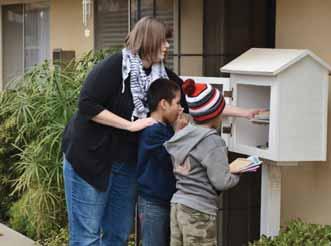
Children look for favorites
The first few stops—at the little library in front of Bergen’s apartment and the Shafter Learning Center—are uneventful, but the sight of the blue Toyota brings a half a dozen neighborhood children out on the street at the next stop. Pulling to the curb, Bergen has the boys set the boxes of books on the pavement so everyone can see what’s available.
One boy is incredulous that he can have as many books as he wants. Preteen girls giggle and tease as they dig through the boxes. Bergen, who knows all the neighborhood children—some from church and others from previous visits or her work as a substitute teacher and school volunteer—makes sure they find the chapter books at their reading level and points out the sticker books that a little sister or brother would love.
Meanwhile the boys empty the little free library across the street of books that have not circulated, refilling it with the fresh stock of paperbacks, hardbacks and activity books for the pre-readers.
Moving on, the library stocking team heads for the little library in front of Iglesia Compañerismo Cristiano, where Bergen co-pastors with Roy Ramirez. “This one gets the most traffic,” Bergen explains. “We fill it up and two days later they’re gone.”
Sharing more than books
Most of the little free libraries in the network are at the homes of members of Iglesia Compañerismo Cristiano. Bergen says the ministry fits the giving spirit in this small congregation of mainly farm-working families. The little libraries give parents an opportunity to share with their neighbors and pass the spirit of sharing on to their children.
At the final stop, Bergen recalls an incident that illustrates the churches’ larger mission for their partnership. She had spent 20 minutes chatting with neighborhood boys while stocking the library, explaining that the books were from a church in town that wanted them to have them.
As Bergen packed up the car to leave, a cluster of boys were talking behind her, and she heard one say, “So what about Jesus? Is he real?” She turned to see the boys all looking at her, waiting for the answer.
The glass door of the little free library had opened to more than just books. The little free library doors have become portals to sharing God’s love for Bergen and Shafter’s two Mennonite Brethren churches who care about their community.—Kathy Heinrichs Wiest View an extended photostory version of this article at www.usmb.org/CLNews.
“I am an educational advocate,” says Melissa Bergen. Bergen, pictured left with Angel & Cesar, oversees the little free libraries in Shafter, Calif.
A beautiful chaos
For Wichita family, obedience and service mean expanding the family
It wasn’t that long ago that David and Shelly Jennings of Wichita, Kan., and their four children had a “Norman Rockwell sort of life,” says Shelly. Then 18 months ago, their hearts and their family expanded beyond Hannah, 22, Seth, 18, Luke, 15, and Hallie, 13, to include 19-year-old Cardarius*, a young man whose background is very different from their own.
While family life is now sometimes messy, Shelly describes their household as “beautiful, God-centered, Godorchestrated.” She says, “For us, love is a beautiful chaos.”
Prepared to serve
The story of how Cardarius came into the Jennings family, who attend First MB Church in Wichita, is one of service and obedience to God’s nudging. It began years ago, with God preparing their hearts. Both David and Shelly have always had a desire to serve in some way. Over the years they talked about various possibilities—hosting students, foster care–but never followed up.
When their oldest daughter, Hannah, graduated from high school, she asked for an unusual graduation gift: a short-term mission trip to Mexico. She and Shelly went in March 2012 and came back with a renewed desire to serve. As a family, they began to look for ways to serve: with special needs kids at church, at the humane society, with their sister church in town, at homeless shelters and nursing homes.
Meanwhile, youth groups at First MB were reinforcing a focus on others and the value of service for the other children. “We couldn’t have taught that alone,” Shelly says.
And the Jennings’ small group at First MB made it a goal to serve as families every month, giving the family further opportunities to practice noticing and meeting the needs of those around them.
So when the Jennings met Cardarius, they were ready. “Our hearts were open to service,” Shelly says. “If those events hadn’t taken place before we met Cardarius, I don’t know if I would’ve felt the heart-tug and the nudge.”
God-orchestrated meeting
They were introduced to Cardarius through basketball. Seth, their oldest son, was invited to compete in a basketball tournament in Texas in the summer of 2014. Looking back, David believes God orchestrated that trip. “There was a reason we went to Dallas.”
The trip gave them an opportunity to meet Cardarius, who was also invited to fill in on the team. “Cardarius and Seth just hit it off,” David says.
The two young men played basketball together through the summer, and the family got to know something about Cardarius’ past, which was quite the opposite of their middle-class, suburban life. Still a teenager, Cardarius was already well-versed in dysfunction, broken families, hurtful relationships, addiction and street life.
Shelly says, “He knows way more than we want our kids to even know.”
But they also got to know his heart. They saw a young man with great basketball talent and life potential and a desire to break the negative cycles of his past. “He really needed some consistency and stability,” Shelly says.
He needed a family.
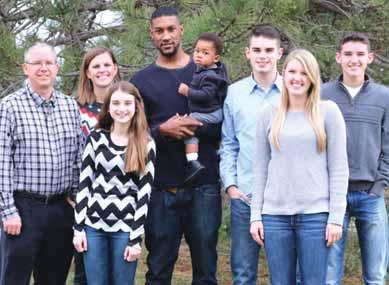
Cardarius (center) and his son are always welcome in the Jennings home and are considered part of the family. The Jennings children—Hallie, Seth, Hanah and Luke— have embraced him as much as their parents have. “They have been so unselfish through this,” says Shelly.
Following God’s nudges
David and Shelly felt a nudge to help him, and they had learned that when God nudges, it’s important to respond. But they weren’t sure what that looked like until one evening in July 2014. As they were dropping Cardarius off after basketball, he clearly didn’t want to go. David simply asked him what he wanted to do.
His answer: “I want to move in with you.”
So they gathered his things and took him home.
David says, “Sometimes you have a desire you need to listen to and go with.”
Right away, the church became a tangible support and resource for the family. Cardarius, a high school dropout with his GED, was headed to junior college in just a few short weeks, but he had only a small suitcase of belongings and was quite unprepared to move out on his own.
So the Jennings put the word out through their church and their schools; both are educators. The response was immediate. Shelly says, “Our dining room was covered with everything a kid would need to go to college: bedding, a microwave, a TV.”
When they loaded their SUV, took him to college and worked through the registration process with him, Cardarius put the Jennings’ names and address on his information form as “home.”
Being family as the story changes
The Jennings readily admit that adding to their family in this untraditional way has been a rocky journey. The story is “forever ongoing,” as Shelly says. “We find ourselves a little bit deeper into it all the time.”
The family loved him, supported him and prayed for Cardarius as he struggled to adjust to classes and college life, as he worked through difficult relationships with his biological family, as he wrestled with whether to stay in school or return to the streets.
In February 2015, Cardarius brought them a new twist: He hesitantly told
them he was going to be a father.
“My jaw dropped and my head spun,” Shelly says. They could have broken the relationship right there and ended their involvement—and Shelly imagines Cardarius probably expected them to do exactly that.
David was the first to speak: “This doesn’t change how we feel about you. What do we need to do to help?”
The couple made sure Cardarius could be present at the birth of his son, and they have since gotten to know the mother’s family. Cardarius’s son, like Cardarius, is always welcome in their home. Shelly tells Cardarius, “Our home is your home. We consider you part of our family.”
A messy story
It’s tempting to look for a nice, tidy bow to wrap this story up: a spiritual awakening for Cardarius, perhaps, or a dramatic turnaround in the choices he makes.
Such a tidy ending doesn’t exist.
“It’s a huge, heavy story—one we hardly even believe we’re part of some days,” Shelly says. At the same time, she says, “We know that to turn around or walk away would be disobedience.”
So they keep listening for those nudges, keep learning to love and serve. David says that sometimes they look at each other and wonder together, “What are we doing?” But faith propels them forward. “It comes down to trusting God,” he says.
Shelly talks about learning “every day, every hour, every minute faith.”
“I can’t tell you how this is going to end up,” she says. “It’s all as unpredictable and messy as it was when we got involved. But it’s a beautiful, messy, chaotic love story. And it’s all going to be OK.”–Myra Holmes
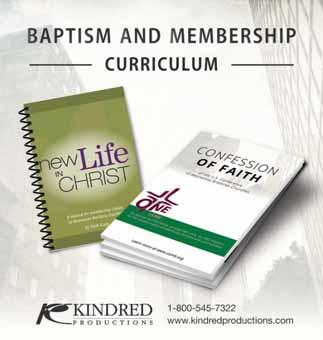
Fire ignites in Midwest
MB Mission team encourages vision for mission
Like the old campfire song says, “It only takes a spark to get a fire going.” A new passion for mission is igniting in the Midwestern United States, and a new team of mobilizers for MB Mission wants to resource churches and people to be part of it.
In recent years, representatives of MB Mission, the global mission agency of North American Mennonite Brethren, began to notice sparks of something new east of the Rockies—an area which includes the Southern, Central, Latin American and North Carolina District Conferences.
When Joanna Chapa, who had been serving as MB Mission’s short-term mission coordinator in the Midwest, left for an overseas assignment, the agency saw an opportunity to not only fill a staffing gap but also to explore these sparks.
Through prayer and discernment, a vision began to take shape; they call it the 2020 Movement. As outlined on the MB Mission website, the team envisions launching 20 missional leaders into local, national and global mission by the year 2020, another 30 by 2030, another 40 by 2040 and another 50 by 2050.
These aren’t only mission workers, but missional leaders who will lead the charge for others and start new missional fires. Stephen Humber, new regional mobilizer and team leader for MB Mission in the Midwest, calls it “a good kind of viral multiplication.”
Taking a team approach
A vision this big needs the attention of more than one person. So in August 2015, a new team of mission mobilizers was put in place to tend the fire.
Humber, based in Denver, Colo., serves as team leader. He brings pastoral experience in both the SDC and CDC and has served on the MB Mission board. He says that having experienced mission from several different angles brings perspective beyond organizational loyalty.
“I’m not a salesperson for MB Mission,” he says. “I get to be a kingdom representative for one of the things that God is doing.” Humber is married to Mary K, and they have two grown children.
Bob and Kelly Pankratz are originally from Kansas and served in pastoral roles at USMB congregations

Leading the effort to equip people for mission in the Midwest are (from left to right) Stephen Humber, Bob Pankratz, Kelly Pankratz, Aaron Myers and Danae Schmidt.
in Kansas and Colorado, with MB Mission in Mexico and with inner-city youth in California before returning to Kansas to establish The Oasis, a ranch and retreat center in Plevna, Kan. The couple has four children: two in college and two in high school.
Danae Schmidt and her husband, Kyle, grew up in Corn, Okla., and attended Tabor College. A short-term experience with MB Mission’s TREK program was such a turning point in Schmidt’s relationship with Christ that she joined the MB Mission Midwest team in order to share that passion with others. She lives and works in Hillsboro, Kan.
Aaron Myers brings experience working with unreached people groups in Turkey. He also serves part-time with Crescent Project, which aims to equip churches to reach Muslims with the gospel. He and his wife, Consuelo, met at Tabor College and currently live in southeast South Dakota. They have two young children.
Mission is everywhere
While MB Mission’s focus in the past has been primarily overseas, this team wants to focus on touching least reached people groups wherever they may be. It’s a vision that’s local, national and global.
The team defines unreached peoples as people groups in which less than 2 percent of the population is evangelized. While the vast majority of these peoples are in countries overseas, many are now coming to the U.S.
“It’s not just global missions,” says Myers. “That just doesn’t exist anymore. The nations are moving around like never before.”
Because the nations are everywhere, the team envisions sparks taking hold in multiple places. For example, a congregation might support missionaries reaching a certain people group overseas, send a short-term team to support and learn from those workers, then begin an outreach to immigrants in their own city. Maybe that congregation could even send workers to another U.S. city that has a pocket of immigrants from that people group.
“The mission is everywhere,” says Schmidt.
The Midwest team believes this movement will quickly jump across denominational lines. Bob Pankratz says, “First and foremost, it’s about Jesus and bringing Jesus to unreached peoples.” When that becomes the focus, denominational boundaries come down pretty quickly, he says. “God’s kingdom is bigger than that.”
So the Pankratzes are working with students not only at Tabor College, the USMB school owned by the Midwest districts, but also with students at other area Christian colleges. Myers uses his cross-cultural experience to equip churches, regardless of their denominational affiliation. And when young leaders who attended a Vision Summit held last fall felt called to mission not only through MB Mission and USMB churches but also through their schools and other mission organizations, the team affirmed and encouraged that.
Kelly Pankratz says it’s all about seeing people surrender their lives to Jesus and to mission. “It doesn’t get any better than that,” she says.
Outsourcing vs. resourcing
Too often, the church has “outsourced” mission to the agencies, as Myers puts it. This team wants to resource local congregations to take hold of mission in new ways, both locally and globally.
That might mean giving missionaries opportunities to share their expertise. For example, a worker who has experience sharing the gospel among women in prisons in Thailand might inspire and equip a local church to reach out to the incarcerated in their community.
Or it might mean providing training on how to reach a particular people group. For example, Myers recently shared his knowledge of Muslim culture with youth from Hillsboro, Kan., and introduced them to opportunities to reach out to Muslims in their own area.
Prayer has been a big part of igniting this movement and will continue to play a key role. Kelly, who is leading the charge in this area, says, “No great revival happens without prayer.” She is working with First MB Church, Wichita, Kan., to plan a prayer conference, and she hopes to offer several similar events in the Midwest in the coming year.
Other ways the team could stoke the fire could include another Vision Summit in fall and new short-term mission opportunities.
Humber observes that local churches represent a spectrum of mission involvement, from those already deeply involved in local outreach and sending workers overseas to those with little or no mission focus. Wherever congregations find themselves, this team wants to help them take the next step.
“If you think we can help, we would love to try to help,” Humber says. —Myra Holmes








Don Morris Mission USA director

Let’s go to the war room
Making use of our strongest weapon
The most recent Kendrick brothers’ movie, War Room, tells the story of a young family in crisis because of a disconnected marriage. The wife, played by Patricia Shirer, evangelist Tony Evans’ daughter, is shattered by her husband’s flirtation with infidelity and is searching for answers. She finds them through an older woman, a new client in her real estate business, who leads her to begin earnestly praying for her marriage and family. War Room is one of those movies that elicits a lot of emotion. When I watched it at a local theater, most in the audience were shedding tears. I had to get a tissue out for myself.
The movie centers on prayer as a powerful lifechanger and is being lauded by some as perhaps the beginning of a prayer movement in our American churches. Many, myself included, are detecting the growth of more and more dedication to prayer in our local churches. I am observing this passion become a greater emphasis with pastors, particularly millennial pastors. I also believe that this movement will continue to accelerate among dedicated and spiritually alive churches across the country.
When I was pastoring Pine Acres Church in Weatherford, Okla., we often held church-wide days of prayer and fasting. Those were wonderful experiences as the church came together to pray fervently for a particular ministry or for the lost in our community. I remember countless expressions
of wonder as people shared how God was working in their life in truly amazing ways. Miracles were not uncommon.
However, my personal view is that far too often followers of Jesus underestimate the power of prayer. At times, it’s almost as if we take prayer for granted and only offer up uninspired peripheral prayers. It becomes what we are supposed to do, and we don’t necessarily have faith that our prayers will make a huge difference. But when people and churches begin to pray with conviction, intentionality, regularity and real faith—marvelous things happen.
In part, I believe we need to do more praying in our churches, specifically for people who don’t yet know Jesus. Pray names out loud. Take before God the names of people who are headed for an eternity apart from him and fight for them in prayer. We must realize that this is a war. It’s a war against Satan, the enemy, who wants to keep us passive and restrained in our prayer life. He doesn’t want us to focus our prayers for people who are unsaved. He knows that prayer is dynamic and changes the outcome of the battle.
Let’s allow God to generate transforming prayer knowledge and prayer hunger within us and within our churches. Let’s habitually go to the war room and carry those people who we know are lost before the throne of God. Let’s go to battle. Prayer is a strong, strong weapon! Did YOU know?
of those who attend church one or more times a month believe they
have a personal responsibility to share their faith, but
have not told another person about how to become a Christian in the previous six months.
Source: LifeWay Research 2015
Christ Church Sellwood growing
Christ Church Sellwood, a USMB church plant in the greater Portland, Ore., area, has witnessed significant numerical and spiritual growth over the past several months, says Don Morris, director of Mission USA.
People who come to Sellwood on Sunday mornings encounter a solid biblical message from church planter and pastor Jared Pulliam.
“Every time I go to Christ Church Sellwood I am challenged and enthused by Jared’s preaching,” says Morris. “He has a gift for taking people deep into God’s word, and he provides very timely takeaways. The worship time is always great as well.”
Sellwood’s growth has necessitated the formation of additional home groups—small groups that meet at various locations in the Sellwood area for prayer and Bible study. During the final week of the month, home groups do not meet, and group members are encouraged to engage with unbelievers. In many cases, this takes the form of hospitality with coworkers or neighbors.
Home groups aren’t the only way relationships are built and people introduced to Christ. “Each month there is an opportunity for either the ladies or men in the congregation to fellowship with each other,” says Pulliam. “The activity and venue varies, but these get-togethers have been an evangelistic tool and an important time to build relationships.”
Launched in September 2013 with 20 adult members, the church now has 70 regular attendees. The venue at Sellwood Community Center has served the church well,
and the relationship with the city for its use is planned for well into the future.
“Sellwood Community Center is available to us for a very nominal monthly fee,” says church elder Josh Skarphol. “That allows us to meet ministry needs and put a little aside for the time when we’ll need to relocate. The facility provides all we need at present, plus it’s a great connecting point in the community of Sellwood.”
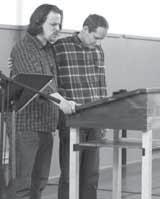
Christ Church Sellwood is the daughter congregation of Trinity Church in Portland and is also being planted in partnership with the Pacific District Conference (PDC) and Mission USA, the USMB church planting and church health and renewal ministry. —Mission USA news story
Neighborhood Church launches
About 100 neighbors—from the homeless to working professionals—helped to launch Neighborhood Church, a new church plant in the Jackson area of Fresno, Calif., that held its first service Jan. 24 in a local elementary school cafeteria.
Among the group was a young father who heard about the new church from a flyer on his door and brought his daughters. “I need church,” the man told church planter Joe White after the service. “I just got out of prison, and I can’t go back. I have to take care of my four kids—they are all I have.”
White assured the young man that the new church will be there for him. The father responded: “Knowing you are here to support me gives me the confidence I need to keep doing the right things. It feels good to be believed in.”
White’s goal is to grow to about 120, the capacity of the cafeteria at Jackson Elementary School, and to then plant
another church in a different part of the neighborhood.— Mission USA news story

CHRIST CHURCH
SELLWOOD
Shelley Plett
Space for grace
Sympathy, empathy and compassion can be pieces of grace
In a perfect world, we understand a friend’s suffering. We relate to their joy. We feel their fear. We know their struggle. Because of this keen sense of understanding, we always offer the best of ourselves and fix what’s wrong. In a perfect world, we offer grace.
But it seems the world is less than perfect. And so are we. Instead, when faced with a chance to respond to someone, whether it’s initiated by them or presents itself by chance, we can sometimes be quick to judge and even worse, quick to dismiss. It may be a case of simply not knowing what to say. Since we aren’t equipped to offer true grace, what are our options when friends need us? And what about others? People we barely know, people we share a negative history with or people we fundamentally disagree with?
Is sympathy enough?
“Human sympathy has its limits.” — F. Scott Fitzgerald, author
Sympathy is our common ground. It is concern for someone and wishing for things to get better. At its best and with people we know, sympathy delivers an immediate connection through a card, a call, a note or a hug. With people we don’t personally know, sympathy can be genuine but disconnected. In any situation, it’s limited because it’s not a shared perspective and doesn’t allow for an honest “I know how you feel” connection. It’s fleeting. But if we open ourselves to it, sympathy may stop us from judging what we don’t understand. And in some way, become a door to empathy or compassion.
Empathy in the trenches
“Rarely can a response make something better, what makes something better is connection. Rarely, if ever, does an empathetic response begin with ‘at least.’” — Brene Brown, researcher and storyteller
Empathy is knowing the layout of the hole someone is in. It’s climbing back down in there and setting up camp. It’s the ability and willingness to sincerely say, “I get it.” Every life brings circumstances that seem surreal — a sit-

uation that tests in unpredictable ways. Mine was the end of my marriage several years ago. I longed for empathy and found it through people who had been there, who understood the complexity of this type of loss. This was when I began to understand the difference between sympathy and empathy. Sympathy is a gift. Empathy is a lifeline.
Compassion equals commitment
“While pity involves the belief in inferiority...compassion assumes equality in common humanity.” — Aaron BenZeev, philosopher and educator
Compassion has been called active commitment. I view it like empathy but on a bigger scale. I’ve seen it shown through my neighbors and friends joining causes from fighting poverty to tackling human trafficking to working to end malaria. And just as importantly, through those working face to face in our own local part of the world. The origin of individual compassion is a mystery and maybe that’s not for us to know. It seems to be a calling from a place beyond shared experiences.
Grace: the impossible goal
“Therefore as God’s chosen people, holy and dearly loved, clothe yourselves with compassion, kindness, humility, gentleness and patience.” — Colossians 3:12
Grace may be unattainable for us, but pieces of it aren’t. Even if we fundamentally disagree, we can be sympathetic by recognizing that others’ views and actions come from an entirely different set of circumstances than we have had. We can be empathetic on the occasions we’re placed in the right situation to do so. We can be compassionate when we choose to answer that call. If we reframe our thoughts, if we listen, if we’re kind and if we don’t judge—just this once—the space for a graceful reaction will grow.
That may be as close to perfect as we can get.
Shelley Plett is the graphic designer for the Christian Leader. She works in design and as a columnist for the Hillsboro Free Press, Hillsboro, Kan.


Matt Ehresman
Heroes don’t hide
Leadership lessons from Luke Skywalker
Ihave to admit: I’m a very casual Star Wars fan. I can’t really tell you anything about Count Dooku, but I am pretty sure I’m supposed to hate Jar Jar Binks. With that said, I did enjoy the latest Star Wars movie. Even if you don’t typically enjoy science fiction and might not totally understand Chewbacca, very few film franchises have impacted our culture as much as Star Wars. Fun special effects aside, there is something innately compelling and awe-inspiring about epic heroes fighting a dark and evil enemy.
I think there’s an important lesson we can all learn from The Force Awakens. As cool as the Jedi are, I believe everyone’s favorite light saber-yielder made a mistake that we should avoid.
When we last saw Luke Skywalker at the end of Return of the Jedi, he was the hero of the universe. The evil Darth Vader was defeated, and at least some sort of balance was reestablished in the Force. Around 30 years have passed, and in the classic scrolling text that kicks off the new sequel we learn that Luke has vanished.
The bad guys have new leadership and are determined to destroy him. Princess Leia is still in the picture, and she too is looking for her brother, Luke.
This new movie is basically a galactic search for one man who clearly doesn’t want to be found. He scatters a few clues embedded in his favorite droid, but he makes it very difficult for a new generation of leaders to find their beloved hero. The galaxy needs Luke, and for reasons that aren’t yet clear, he’s hiding (with a really cool beard).
There are numerous theories circulating on the Web about why Luke went into seclusion. Maybe he’s afraid of his own power and doesn’t trust himself to resist the temptation of the dark side. Maybe he’s embarrassed about the chaos his family is responsible for. Or it could be that he’s just a tired old man who would rather read the newspaper with a cup of coffee in a bathrobe and slippers.

Does that sound like Luke Skywalker to you? He’s a film icon—one of the coolest heroes to ever grace our screens. When the galaxy is in trouble, who you gonna’ call? If the Ghostbusters aren’t available, the obvious answer is Luke Skywalker!
The next movie may reveal a good reason for Luke’s absence, and his reputation may be restored. But with what we currently know, I’m disappointed in Luke. Heroes don’t hide. Even when they’re scared, leaders act and inspire.
If you’re in a place of leadership at work, at church, in your family or in any other context, a time will come when people look to you for direction, training and encouragement. Maybe you have a stellar leadership track record like Luke, or maybe you’re more like Finn or Rey—the new generation of leaders with passion and potential but little experience.
Don’t shrink away from the big moment. There are at least 100 verses in the Bible where God commands us not to fear. Romans 13:1 tells us, “There is no authority except that which God has established. The authorities that exist have been established by God.”
Emerging young leaders in my generation need guidance from people who are a few “episodes” ahead of us. Whatever age and stage of life you find yourself in, don’t let your past or fears about the future keep you from being the hero we need you to be. Don’t underestimate your experience or the value you can provide.
Of course, unlike Leia, our “only hope” comes from One greater than Obi Wan. But we all still need guides that are brave enough to step up and lead the next charge—even if you don’t have a cool beard or amazing light saber skills. Prayerfully and boldly move forward as the leader God has called you to be.
Matt Ehresman and his wife, Tillie, live in Wichita, Kan., where he is the creative media director at First MB Church.
How can I form a relationship with a Muslim coworker or neighbor? A helpful resource may be Christian. Muslim. Friend., written by David W. Shenk and published by Herald Press.
Shenk’s book is among 13 books chosen by Christianity Today as “the books most likely to shape evangelical life, thought, and culture.”
Shenk’s book received the top 2016 Christianity Today award in the Missions/The Global Church category.


milestones
BAPTISM/MEMBERSHIP
Byron Hill and Macguire Arnold were baptized and received as members of Enid (Okla.) MB Church Dec. 6, 2015. Ben and Kendale Barker, Sara Hill and David and Sarah Rader were also received as members.
Barry and Melissa Braun were received as members of Shafter (Calif.) MB Church Dec. 20, 2015.
Timothy Heien was baptized in December 2015 and received as a member of Grace Bible Church, Gettysburg, SD Wayne, Miriam, Mariah, Joshua and Caleb Kliewer and Tim, Alissa and Avery Unruh were received Oct. 25, 2015, as members of Hillsboro (Kan.) MB Church
Chloe Anderson, Samuel Dean, Winona Dowell, Doug and Patty Gosling, Debra Gowdy, John and Cristin Harrell and Allison Laverty were received as members of Laurelglen Bible Church, Bakersfield, Calif., Nov. 22, 2015. Joel LePere, Whitney Harrington, Tonya Riley, Frank Lauro, Jake Lauro, Logan Weeks and Kendal Weeks were baptized Nov. 15, 2015.
John Nachtigall was baptized Jan. 17 at Zoar MB Church, Inman, Kan
William Embrey, Heather Hansen and Isabella Vidal were baptized Nov. 1, 2015, at Rosedale Bible Church, Bakersfield, Calif. Bradley and Laurie Downing and Andrew and Jaclyn Krause were received as members. Abigail Meyer, Grace Weldin, Sarah Weldin and Julie Todahl were baptized on March 8, 2015, and Greg and Tami Root were received as new members.
The following people were baptized in 2015 at South Mountain Community Church, Draper, Utah: Owen Madsen, Grace Benedick, Stan Jensen, Jazmine Wittman, Sharisa VanSlooten, Angelica Langford Tiffany Ross, Alex Anastasi, Kaitlyn Wampler, Matt Lang, Reagan Sanders, Priya Govind, Katrina Dolle, Elsie Moyer, Hayley Thomas, Aiden Wampler, Abby Sandgren, Bonnie Sandgren, Meggie Davenport, Brad Davenport, Juana Lopez, Chandler Beers, Brittany Devey, Hilary Hall, Brandon Elder, Mark Rector, Lane McCulloch, Scott Tollstrup, Steve Cogner, Allison Hanna, Megan Hanna, Isaac Kensinger, Joshua Avila, Myah Ingebritson, Brianna Allen, Jaylee Holman, Kuby Glendening, Rachael Walden, Tara Holman, Liz TippingAllred, Paul Allred, Bobbie Morris, Rafaela Rose, Renata Melo, Colleen Glendening, Jarrod Atkinson, Rachel Atkinson, Jenny Douglass, Edwin Douglass, Wyatt Douglass, Emily Douglass, Haily Douglass, Gordon Douglass, Kayla Smith, Wyatt Moon, Angela McLean, Sharisse Knight, Nick Knight, Jaden Knight and Jillian Wood. Keaton Opie was baptized May 17, 2015 at the SMCC South Jordan campus.
Robert and Cindy Haude were received Jan. 3 as members of Parkview MB Church, Hillsboro, Kan
Andrew and Kaitlyn Buchheit, Seth and Brooke Bullard, Nathan and Vanette Buller, Mark and Charity Chan and Christina DeHass were received Dec. 6 , 2015, as members of Memorial Road MB Church, Edmond, Okla
Whitney Allen and Jonathan Douglas were received as members of College Community Church MB, Clovis, Calif., Dec. 20, 2015.
WORKERS
Stephen Christian is the new children’s ministry pastor at First MB Church, Wichita, Kan
Malcolm Light will be installed April 3 as senior pastor at Reedley (Calif.) MB Church. A farewell service for retiring pastor Dennis Fast will be held April 10.
Wilmer Thiessen has resigned as visitation pastor at Parkview MB Church, Hillsboro, Kan., effective Jan. 18.
David and Emily Buller are no longer the pastoral couple at Cornerstone Community Church, Topeka, Kan. They are now on staff at the Oasis Ranch and Retreat Center, Plevna, Kan.
Daniel Feister began serving in February as pastor at Bible Fellowship Church, Rapid City, SD
Stephen Stout is now pastor at Faith Bible Church, Omaha, Neb. He had been serving as interim.
Wes Wilmer has resigned as pastor of Sanctuary Fremont, a church plant in Fremont, Neb., effective Feb. 1.
Rick Eshbaugh ended his term as part-time pastor of Harvey (ND) MB Church Jan. 24. He and his wife, Esther, have moved to Sioux Falls, SD, where he will serve as full-time district minister for the Central District Conference.
Sean and Jennifer Estes were installed Jan. 10 as the youth pastoral couple at Corn (Okla.) MB Church
Paul Canaday was called Jan. 10 as the new pastor at Grace Community Church, Sanger, Calif
Bill Koogler has resigned as pastor of Good News Fellowship, Ferndale, Wash. He and his family are relocating to Dubai, where he will serve as associate pastor for a large evangelical church.
Troy Weiland has resigned as pastor of Christ Community Church, Sioux Falls, SD
Mark Brumbaugh is the new associate pastor of discipleship at Enid (Okla.) MB Church

Copper Hills celebrates first facility
Copper Hills Church, Phoenix, Ariz., celebrated a new facility with a dedication Jan. 10 and a public grand opening Jan. 23. This is the first building for the 19-year-old congregation and is designed to meet community as well as congregational needs. The building is phase one of a master plan that will be a performing arts center for the community and includes a 500-seat auditorium/worship center and classrooms that can double as practice studios or dressing rooms in the future.
Pastor Brad Klassen says that when Copper Hills was planted in 1997, the church set out to learn what the community wanted. One need that quickly rose to the surface was a place for the performing and creative arts. Copper Hills hopes to hire an arts director to run the performing arts center as a ministry, with its own staff and leadership.
The new building is located in the “bulls-eye” of a community of about 10,000, right next to a 17-acre park, a community center and a K-8 school, and it was designed to blend in visually.
The project was funded with help from Pacific District Conference (PDC) and MB Foundation (MBF).
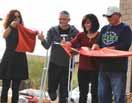

Jake Friesen dies
Jacob Friesen, 95, a medical doctor who served for 20 years in India with MB Mission, died Jan. 20, 2016, in Reedley, Calif. Friesen and his wife, Ruth, established the Jadcherla Medical Center in Andhra Pradesh in 1953, a medical center that over the years has continued to serve many. Upon learning of his death, memorial services were also held in India in recognition of Friesen’s contributions. Friesen was born March 19, 1920, near Inola, Okla., to Jacob and Katherina Friesen. He married Ruth Berg on June 22, 1950, and the couple had four children: John, Eileen, Gary and Kenneth.
Harvey churches merge
Harvey (ND) MB Church and Bethel Baptist Church, a North American Baptist congregation in Harvey, finalized their merger Jan. 19 when they affirmed a new constitution and a new name—Cornerstone Community Church. The new congregation will be affiliated with both denominations and has called Abel Threeton, with Interim Pastoral Ministries, as the interim pastor beginning March 6. The two congregations, which together number between 100 and 130, have been worshipping together since September 2014 and will continue to alternate between the two church buildings for Sunday worship gatherings. The Wednesday night Awana program meets at Bethel Baptist, now called the North Campus, while the high school youth group meets at the South Campus, formerly Harvey MB Church.
Jim Aiken is the new pastor at Heritage Bible Church, Bakersfield, Calif
DEATHS
Arhart, LaVerne, Huron, SD, of Bethesda Church, Huron, April 28, 1939—Jan. 13, 2015. Parents: Alfred and Clara (Feistner) Arhart. Spouse: Judy Summers. Children: Ellie Kleinsasser, Vicky Schneider, Andrew, Jonathan; 11 grandchildren.
Dick, James Franklin, Bakersfield, Calif., member of Rosedale Bible Church, Bakersfield, Dec. 29, 1924—Oct. 5, 2015. Parents: Dietrich and Justina Dick. Spouse: Florence Bell, deceased. Children: Judy Pohle, Ken; four grandchildren; five great-grandchildren.
Elrich, Elvin, Bakersfield, Calif., member of Rosedale Bible Church, Bakersfield, July 29, 1924—Dec. 23, 2015. Parents: Peter and Bertha (Nikkel) Elrich. Spouse: Willa Cornelson. Children: Kay Spencer, LeAnn Augsburger, Rick, Bill, Scott; six grandchildren; two great-grandchildren.
Fast, Kathryn, Fairview, Okla., member of Fairview MB Church, May 7, 1935—Jan. 15, 2016. Parents: Ray and Avis Pendergraft. Spouse: Bob Fast. Children: Rayfford, Daryl, Mark; one grandchild; four great-grandchildren.
Filler, Bernice, Harvey, ND, member of Harvey MB Church, March 6, 1918—Jan. 21, 2016. Parents: Henry and Anna (Opkis) Wricks. Spouse: Ted Filler, deceased. Children: Thomas, John, Judith Neigel, Susann Patzer; 14 grandchildren; 16 great-grandchildren; three greatgreat-grandchildren.
Filler, Darleen, Harvey, ND, member of Harvey MB Church, Aug. 10, 1930—Nov. 16, 2015. Parents: Michael and Lydia (Moser) Gesellchen. Spouse: Roy Filler, deceased. Children: Steven; two grandchildren; four great-grandchildren; one great-great-grandchild.
Hagen, Lewis, Hillsboro, Kan., of Hillsboro MB Church, June 5, 1929—Dec. 8, 2015. Parents: John S. and Carolina (Wall) Hagen. Spouse: LaVada David, deceased. Children: Coleen Koop, Tammy Ollenburger, John; seven grandchildren; one great-grandchild.
Janzen, Franklin Joe, Reedley, Calif., member of Reedley MB Church, April 26, 1931—June 25, 2015. Parents: Frank and Bertha (Kroeker) Janzen. Spouse: Judith Pauls. Children: Paula Friesen; two grandchildren.
Johns, Joseph “Joe” E., Weatherford, Okla., member of Pine Acres Church, Weatherford, Sept. 27, 1938—March 13, 2015. Spouse: Glenna. Children: Traci Brownen, Darren; three grandchildren.
Klassen, Martha Louise Loewen, Lodi, Calif., of Vinewood Community MB Church, Lodi, Sept. 28, 1925—March 12, 2015. Spouse: Victor Klassen. Children: Mark, Cyndi Pagliaro; five grandchildren; four great-grandchildren.
Neufeld, Isaac “Ike,” Fairview, Okla., of Fairview MB Church, Oct. 8, 1924—Dec. 8, 2015. Parents: Herman and Justina (Heinrichs) Neufeld. Spouse: Eva Leona Martens. Children: Don, Keith, Jean; six grandchildren; one greatgrandchild.
Radtke, Robert, Clovis, Calif., member of Bethany Church, Fresno, Calif., Oct. 31, 1929Jan. 15, 2016. Spouse: Ione. Children: Two sons. Ratzlaff, Howard James, Oak Harbor, Wash., former member of Koerner Heights MB Church of Newton, Kan., and Hesston (Kan.) MB Church, March 14, 1933—Jan. 10, 2016. Parents: Reuben and Julia (Funk) Ratzlaff. Spouse: Rose. Children: Lyle, Gayle Ast, Scot, Fern Vogt; nine grandchildren; three great-grandchildren.
Schale, Estil, Bakersfield, Calif., former Mennonite Brethren pastor, Jan. 5, 1919— July 9, 2015. Parents: Abe and Elizabeth Schale. Spouse: Irene Sawatzky. Children: David; three grandchildren.
Schroeder, Milo Henry, Buhler, Kan., member of Buhler MB Church, Oct. 1, 1920—Dec. 21, 2015. Parents: David and Mary (Neufeldt) Schroeder. Spouse: Leatrice Peters. Children: Don, Maxelin Wiebe, Nancy Kopper; eight grandchildren; 12 great-grandchildren.
Thiessen, Erma, Garden City, Kan., charter member of Garden Valley Church, Garden City, Sept. 16, 1921—Nov. 15, 2015. Parents: Isaac M. and Susie (Wiens) Friesen. Spouse: Ed Thiessen, deceased. Children: Suzanne Wiens, Cynthia Knight; eight grandchildren; 19 greatgrandchildren.
Vogt, Leona Jane, Fairview, Okla., of Fairview MB Church, March 26, 1927—Dec. 10, 2015. Parents: A.B. and Marie (Unruh) Kliewer. Spouse: Leonard Vogt. Children: Grace Klewitz, Dwight, Dewayne; 13 grandchildren; seven great-grandchildren.
Warkentin, Ben, Fresno, Calif., member of Bethany Church, Fresno, Dec. 31, 1923—Jan. 17, 2016. Parents: Henry and Lizzy (Buhler) Warkentin. Spouse: Geri. Children: Rebekah, Ruth.
reaching in
FELLOWSHIP
A Dec. 1 women’s event at Dinuba (Calif.) MB Church featured crafts, cookies and conversation.
First MB Church, Wichita, Kan., hosted a “painting and pastries” women’s event Jan. 16.
Feb. 13 was a daddy/daughter date night at North Oak Community Church, Hays, Kan.
WORSHIP
Mountain View Community Church, Fresno, Calif., added a third Sunday morning worship service Jan. 24. Service times are now 9:00 a.m., 10:45 a.m. and 12:30 p.m.
reaching out
LOCALLY
Advent giving at North Fresno (Calif.) Church included food baskets for local families and relief kits for Syrian refugees.
Bible Fellowship Church, Minot, ND, hosted a “birthday party for Jesus” at a local school Dec. 18.
Over 20 children from Iglesia Compañerismo Cristiano, Shafter, Calif., ranging in age from three to 21, spent time with the college and career group from
Local Church Job Openings
Associate Pastor: North Fresno MB Church is seeking a full-time associate pastor of student and family ministries. The church is located in an urban area of the 500,000-plus city of Fresno, Calif., and is highly involved in the surrounding neighborhood. Main responsibilities include leadership and oversight to junior high, senior high and college ministries, as well as other opportunities depending on giftedness. The candidate should have a passion for Jesus, the church and the city as well as demonstrated ability to disciple and equip young people. For more information or to apply, contact Aaron Wiens, board chair, at docwiens@gmail.com.
Leadership Development
Urban Ministry Leadership Development: The Micah Project is a 10-month discipleship experience that places participants (20-30 year olds) in a community setting while exploring church and urban ministry and growing in leadership development. Participants volunteer in local North Fresno MB Church or Fresno Area Community Enterprises ministry, participate in house meetings to study core content curriculum on urban issues, meet bimonthly with a NFC mentor, meet regularly with the program director and take intentional time to spend with roommates and in the community. Check out Micah Project at themicahproject.wordpress.com Applications for the 2016-17 program due March 28.
Shafter MB Church in December for the third annual “Sister Church Christmas Kids Event.” They made ornaments, frosted cupcakes, played games, wrote thank you notes and made hygiene kits for MCC. Refreshments included pizza, oranges, lemonade and chocolate.
Volunteers from Laurelglen Bible Church, Bakersfield, Calif., distributed gift bags and stuffed animals to residents of local senior care centers on Christmas Day.
Agency Job Openings
Chief Executive Officer: Choice Books, LLC is a faith-based organization that distributes over 5 million inspirational books annually to retailers in the secular marketplace. The current CEO is retiring in 2016 after 22 years of service. The successful candidate will have a passion for Christian ministry, strong servantleadership skills, and solid business/management experience. Experience in retail/wholesale operations preferred. Strong communication skills. Innovative and visionary, bringing new ideas and strategies. Position located in the Harrisonburg, Va., office and will begin May-June 2016. Send resume with cover letter to: duanemdoc@icloud.com
Building Fund
Gospel Fellowship Church, Wolf Point, Mont., lost its meeting facility to a fire in November 2014. MB Foundation is serving as a conduit for GFC as they seek to raise capital for their building project. Those interested in supporting GFC are invited to visit www.mbfoundation/givetogosepelfellowship.
Travel
Experience the Holy Land! Join Dr. Tim Geddert (Seminary) and Pastor James Bergen (N. Fresno Church) on a dynamic 10-day tour of Israel. May 16-28, 2016. Contact Sharon Wall at Golden Valley Travel (800) 743-8151 or sharon@goldenvalleytravel.com.
Visit Europe the Mennonite Way! Multiple hotel tours focusing on Mennonite-Anabaptist history in Holland, Belgium, Germany, Switzerland, Poland and Ukraine. Organized by Mennonite Heritage Tours, www.mennoniteheritagetours.eu































































